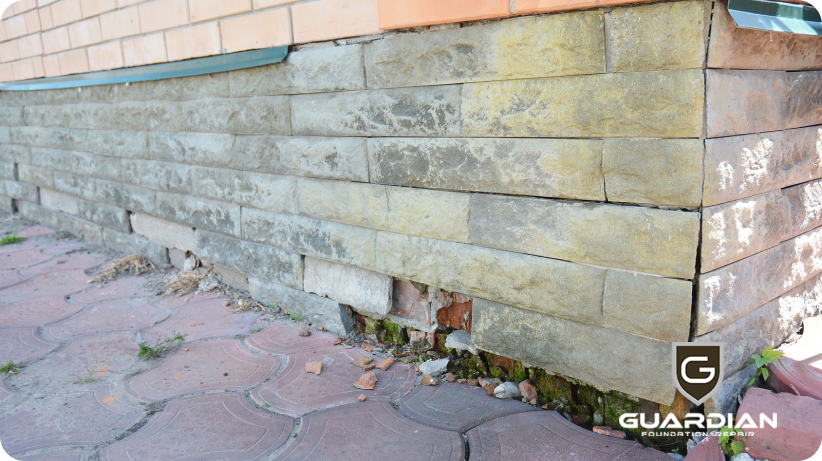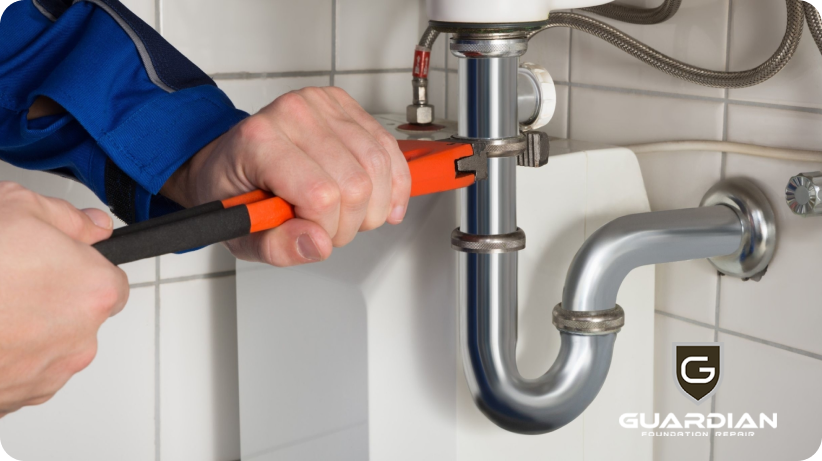Introduction:
Maintaining your home involves numerous tasks, but one crucial aspect that often goes unnoticed is the foundation. Neglecting early warning signs can escalate into significant foundation damage, leading to costly repair procedures.
The truth is, foundation replacements can be a financial nightmare, costing thousands of dollars. However, taking a proactive approach to foundation maintenance can strengthen your home’s foundation, preserving both its value and your finances.
In this blog, our foundation repair experts will highlight the critical importance of your home’s foundation and share several effective steps you can take to safeguard your home against the need for foundation replacement.
The Critical Role of Your Home’s Foundation
Your home’s foundation is much more than just a platform that your house sits on. It is the bedrock of your home’s stability, safety, and longevity. Here’s why the foundation is so crucial:
- Structural Support: The foundation bears the entire weight of your home, distributing it evenly to prevent uneven settling. This structural support ensures your home remains stable and upright, safeguarding against potential collapse or significant structural damage.
- Resistance to Movement: Homes are subject to various forces, from the weight of the house itself to external pressures like soil expansion and contraction and even seismic activity. A solid foundation resists these movements, preventing damage to the structure of your home.
- Protection Against Water Damage: A well-constructed foundation protects against water intrusion. It keeps groundwater and rainwater from seeping into your home, thereby preventing moisture-related issues such as mold, mildew, and wood rot, which can compromise the health of your living environment and the integrity of your home.
- Insulation: Foundations, especially those that are properly sealed and insulated, play a significant role in the thermal efficiency of your home. They can help keep your home warmer in the winter and cooler in the summer, contributing to overall energy efficiency and comfort.
- Preservation of Property Value: A strong and stable foundation is critical to maintaining and even increasing your home’s value. Potential homebuyers are less likely to invest in a property with foundation issues due to the high costs and complications associated with repairs. Therefore, a sound foundation is essential for securing your investment.
- Prevention of Infestations: Cracks or openings in a compromised foundation can be entry points for pests, such as insects and rodents. Maintaining the integrity of your foundation helps prevent such infestations, contributing to a healthier and more secure home environment.
Now, let’s move on to the signs of foundation damage.
Key Signs of Foundation Damage

While a professional foundation inspection is the definitive way to determine the extent of repairs needed, there are several indicators you can look for that suggest underlying foundation problems:
- Warped Floorboards and Sloping Floors: One of the most noticeable signs of foundation issues is when floors begin to warp or slope. This can indicate that the foundation is shifting unevenly.
- Gaps in Trim, Such as Crown Molding and Door Frames: If you start noticing gaps in the trim around your home, it could be a sign that the foundation is moving and affecting the alignment of the house’s structure.
- Drafts Caused by Gaps Around Windows: Similar to gaps in trim, drafts around windows can signal that the foundation has shifted, causing the windows to no longer fit snugly in their frames.
- Rotting Joists and Beams: Foundation problems can lead to moisture issues, which can cause the wooden components of your home, like joists and beams, to rot.
- Pooling Water or Water Stains in the Basement: Water intrusion in your basement can directly result from foundation cracks or gaps, leading to pooling water or visible water stains.
- Mold Growth: The presence of mold, especially in the basement, can be a sign of excessive moisture due to foundation issues. Mold thrives in damp environments and can be created by foundation leaks.
These structural damages might seem like inevitable consequences of an aging home. Still, even older homes can maintain their structural integrity with routine inspections and foundation repairs as and when required by hiring professionals.
Worried about potential damage to your home’s foundation?
Let the experts at Guardian Foundation Repair inspect it for you.
Call now for peace of mind
8 Simple Steps to Avoid Foundation Replacement
Tackling Moisture
Moisture is a major problem for many homes in Knoxville, especially those with basements or crawl spaces. Keeping moisture away is key to preventing foundation damage. Here’s how experts recommend doing it:
- Use Dehumidifiers: Dehumidifiers in your basement or crawl space can make a big difference. It pulls moisture out of the air, which helps stop condensation and keeps humidity low. This also helps prevent mold from starting in your basement and spreading around your house.
- Install Sump Pumps or Drains: While dehumidifiers effectively control air moisture, they fall short when addressing significant leaks or standing water. This kind of water intrusion can cause foundation water damage, leading to cracks and soil erosion that compromise the structural integrity of your home. To combat this, sump pumps and drainage systems play a crucial role. They actively remove water that enters your basement, preventing it from causing harm to your foundation.
Implementing a French drain or installing a sump pump offers a proactive measure against these issues. Consulting with a home foundation expert can help determine the most suitable solution for your home, ensuring your foundation remains secure and dry.
Keep Water Out
Ensuring your home’s foundation remains dry and secure involves choosing the right moisture control methods based on the severity of your situation. Here are some effective options:
- Vapor Barrier Installation: Vapor barriers are an excellent solution for homes battling constant humidity issues. These barriers are designed to offer complete ground coverage, from wall to wall, effectively blocking moisture from seeping up from the ground. Installation typically involves laying a thick, durable plastic sheet across the floor of your basement or crawl space and up the walls, ensuring it’s sealed properly to prevent any moisture ingress.
- Basement Waterproofing: Adding an extra layer of protection to your basement walls with waterproofing is another proactive step. This method involves applying a waterproof coating or membrane to the basement walls, creating a solid moisture barrier. Basement waterproofing can be done externally, to prevent water from entering, or internally, to manage water that does penetrate. This dual approach ensures comprehensive protection against moisture.
- Encapsulation: Encapsulation is the way to go for thorough basement or crawl space waterproofing. Unlike a vapor barrier, which primarily covers the ground, encapsulation includes covering the floors, walls, and even ceiling beams, providing an all-encompassing moisture barrier. Investing in crawl space encapsulation services is particularly recommended for homeowners with crawl spaces, as it transforms the area into a clean, dry space, free from moisture and the problems it brings.
Each method protects your home’s foundation by keeping water and moisture at bay. Depending on your specific needs—whether it’s dealing with high humidity, preventing water ingress, or fully sealing off your basement or crawl space—there’s a solution that fits. Consulting with a foundation expert can help you decide the best approach for your home, ensuring long-term protection and stability for your foundation.
Redirect Water Away
Water accumulation near your foundation is a leading cause of damage, weakening the soil and causing settlement issues. Effective water management strategies are key to safeguarding your foundation from water-related problems. Here are some practical measures:
- Gutters and Downspouts: The first line of defense against water damage is ensuring your gutters are free from debris and functioning properly. Gutters play a crucial role in collecting rainwater and directing it away from your foundation. Regular cleaning and maintenance are vital to prevent blockages and ensure water flows freely.
- Downspout Extensions: To further protect your foundation, downspouts should extend at least six feet away from your home. This prevents water from pooling around the foundation. Downspout extensions are an easy and effective way to achieve this distance, ensuring water is directed away from your home.
- French Drains: For more comprehensive water management, consider french drain installation. This underground system, featuring a perforated pipe encased in gravel or rock, is designed to redirect water away from your foundation. French drains are particularly effective in areas prone to excess water accumulation.
Beyond these methods, there are innovative ways to utilize redirected water, adding value to your water management efforts:
- Rain Barrels: Installing a rain barrel beneath your downspout captures runoff water, which can be used to water your garden or lawn. This not only helps manage water efficiently but also conserves water.
- Rain Gardens: Planting a rain garden in strategic areas can absorb runoff water, preventing it from seeping into the ground near your foundation. Rain gardens are not only functional but also add beauty to your landscape.
By adopting these strategies, you can effectively redirect water away from your foundation, preventing potential damage and maintaining the structural integrity of your home.
Addressing Plumbing Leaks
The plumbing system in your home plays a significant role in maintaining the integrity of your foundation. Regular inspections and maintenance of your plumbing are essential to identify and fix leaks as soon as they occur. Promptly addressing plumbing leaks is crucial in preventing water from accumulating around your foundation, which can lead to serious foundation problems over time.
Prompt House Foundation Repair
Upon noticing any signs of foundation damage, such as visible cracks, uneven settling of your home, or persistent moisture issues, taking immediate action is imperative. Ignoring these signs can lead to more extensive and costly repairs and may necessitate home foundation replacement in severe cases.
Invest in Professional Foundation Repair Service to Strengthen your Home’s Foundation
Foundation replacement ranks among the most costly investments a homeowner might face. Yet, when a foundation significantly deteriorates, this expenditure becomes unavoidable. The key to preserving your home’s foundation—and sidestepping the substantial costs and hassles tied to foundation damage—lies in vigilance and timely intervention. Seeking professional house foundation repair services at the first sign of trouble can make all the difference.
Guardian Foundation Repair, serving the Knoxville area, stands ready to address all your foundation needs. Our expertise spans from basement waterproofing to crawl space encapsulation services, offering comprehensive solutions to maintain a stable and healthy foundation for your home. By partnering with us, you gain access to a team that ensures your foundation’s integrity.
To discover more about how our expert solutions can benefit your home, we invite you to request a free inspection. This no-obligation assessment can provide valuable insights into the condition of your foundation and the best steps forward to protect your investment.

